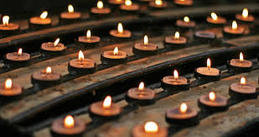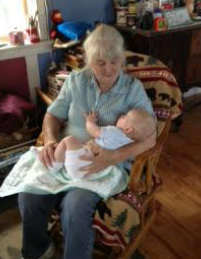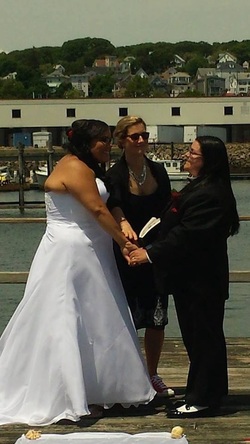discipleship
in chaos
Learn more about who we are by following our blog, written by our pastor, preacher, and chief evangelist. Engage in the everyday sacred as Abby writes about the deep and ordinary all at once.
In my new role, I began identifying myself as a Progressive Christian. I no longer apologize. Instead of defining myself against conservative Christianity , I began to identify myself with Jesus.  I am a progressive Christian. Some might argue identifying myself as a progressive Christian creates unnecessary barriers. I disagree. Besides, I honestly can’t call myself a Christian in the current religious culture. Here’s why: For the past twenty years I have spent far too much time apologizing for Christians who spread hate, create discord, and declare judgment. If asked my profession, I would often begin with, “I am a pastor, but I’m not a bible thumper.” Or “I think other religious traditions are fine.” Or “I’ve married gay people.” I can never simply identify my profession without qualifying. (Yes, there is a certain amount of this I need to own as an individual, but I don’t think this is only about my professional hang ups). In graduate school, I had to visit the University Clinic. I was certain the doctor caring for me was gay. My heart ached in her presence. It was well known that the Seminary I was attending had a number of outspoken students and professors who publically condemned homosexuality. I felt complicit. What if this perfectly able doctor who was caring for me assumed I was part of the loud, angry religious voice condemning her life and love? I kept apologizing during graduate school, after graduate school, in social circles, among family, in friendships. I defended myself. I defended my faith. I explained how I was different. I published articles and preached sermons in support of gay marriage, abortion rights, women’s ordination, interfaith relations, environmental justice, and modern science. I continued to define myself against the conservative Christians that received all the media time, instead of with Jesus. Then I became the pastor of Grace Community Boston where I was free to shed worn out religious language and traditions. In my new role, I began identifying myself as a Progressive Christian. I no longer apologize. Instead of defining myself against conservative Christianity , I began to identify myself with Jesus. If asked now about my profession, I answer simply, “I am a progressive Christian pastor of a really whacky and wonderful emergent community.” If asked about my religious beliefs, I answer as simply as I can, “Jesus has a hold on me. I try to follow his message of love.” Grace Community Boston also identifies itself as a Progressive Christian Community. It is clear, from the moment anyone attends a gathering at Grace, that we are progressive. It is evident when you click through our website or visit our facebook page that we are progressive. Perhaps this turns some people off, but it invites more people in. Tragically, so many assume they are not welcome in the Christian tradition because they are gay, or practice yoga, or prefer hip hop to hymns, or love Harry Potter, or hate dressing up, or don’t believe in Jesus’ resurrection, or had an abortion and don’t regret it, or would rather walk in the woods than read the Bible, or support stem cell research, or aren’t sure what prayer does . . . The list is endless. I am a progressive Christian, and I am tired of apologizing. I am tired of refuting the opinions of conservative Christians who dominate the media. Instead I want to share with you what makes me a Progressive Christian. Over the next ten weeks I will let you know ten things progressive Christians DO. But before I do that, be warned, there will be one more blog about how belief and actions relate. And if you want a sneak peek at Grace Community Boston’s top ten list, click here, or check out the tab entitled Ten Things Progressive Christians DO on this site. .
0 Comments
We could have even done more repair work on Marie's home which sorely needs it. But our wise treasurer thought building Marie a chicken coop was the best thing to do and she was right.  Our community met Marie in the summer of 2012 when our team insulated and replaced a ceiling in her home. We all feel instantly in love. It was easy to do. We were quickly encircled in her gratitude and hospitality. There are objects all over Marie’s home that reveal her nature: bird feeders, pictures of children, grandchildren, great nieces, handmade objects, baby dolls, and the most telling—a toy once enjoyed by a grandson who died. Marie has lived a life full of great sadness and great love. She has raised a gaggle of children, not all biologically hers, and with such love has come sorrow. She is honest about her heart break and free with her love. Her husbands have disappointed her, but she continues to live in the world as one who trusts love is the only answer. How could we not have fallen in love with Marie? Last year after installing a skirt around her trailer and painting the back of her home we had a lazy afternoon before us, talking with Marie about her farm. She had lost her coop in a fire and now only had a few chickens strolling around her yard. One of these chickens, a rooster, had a comb splattered with white paint from our children’s wild painting job. Marie was tickled pink at the sight. She enjoyed even more watching our children play in her field, exploring the nooks and crannies of her beautiful farm. Not too long after I was called aside by the treasurer in our community. Knowing the numbers, she was happy to report we had a surplus in our mission trip account. What if we hired someone to build a coop for Marie to house her chickens? It didn’t take long for the “official” leaders in our community (note: that is pretty much all the adults) to agree that this would be the best way to spend our surplus. By October, Marie had a coop. Last winter she wrote us twice to report on her snug chickens and the joy they brought her was evident on the lined page. I once read an article entitled Bread and Roses. Although I cannot remember the details of the article, the title has forever informed my thinking about those who Jesus calls the least among us. The author of the article argued (more articulately than I ever can) that the poor need both bread and roses. We could have made sure Marie’s oil tank was full for the winter, paid her electric bill, or filled her pantry. We could have even done more repair work on Marie’s home which sorely needs it. But our wise treasurer thought building Marie a chicken coop was the best thing to do and she was right. Marie, like all of us, needs bread and roses. Her new chicken coop is, I am sure, more beautiful to her than a vase of long stem roses. And there is no question that is has brought her great joy. We’re going to see Marie in a few short days. We are eager to see her new coop and meet her new chickens. Hopefully her roosters white painted comb has worn off. I am sure Marie will encircle us in love and her natural hospitality. But I wonder what roses we might offer her this year. I wonder what roses we all need in our lives, beyond daily bread, that remind us that love is always worth the risk of heartache. This blog is for my sister-in-law Lisa, a great woman of faith, and a woman who records it all! It is the moment in my life during which I was certain I had arrived into the life I had dreamed of. And I am positive if I were to watch a recorded clip of this moment it would not be half as wonderful as it is in my memory.  At the end of the wedding over which I recently presided, the groom took out his cell phone and snapped a selfie of himself, his bride, and me right before they walked down the aisle. The new norm is to capture every unfolding moment with our cell phones. When my youngest learned how to ride her bike just a few weeks ago, my middle son filmed her pedaling away while I ran beside her (note: it was a small miracle that I actually had my phone). Afterwards, my three kids gathered around me and watched the 10 second clip. And what did we do next? Uploaded it to facebook, of course. Even more telling of the new cultural norm, we texted the clip to my husband in India so he could watch his girl’s determined cycling. I wonder if this obsession with visually recording every life moment will eventually lose its luster? Or maybe in the future my children will be disappointed when they discover I did not record every moment of their lives with my phone. My mother was a picture taker back in the 70s. I love to find envelopes of pictures hidden away in my childhood home. The pictures are a window into my very happy childhood. But certainly my mother did not record every adorable moment. Her snap shots are predictable: my grandmothers and me after my dance recital, blowing out the candles on my ten year old birthday cake, 4th grade field day. Pictures were expensive to develop and parents couldn’t live their lives with large cameras dangling from their necks. But still the memory of my childhood, with or without my mother’s pictures, comes flooding back to me likes stills in an old movie. I am afraid that if I were to come across thousands of pictures of every growing up moment, my childhood would seem less sublime and much more ordinary. *** Recently my three children and I met my husband at the airport after his three week trip to India. As we waited for him to walk through the security gate my children were overwhelmed with anticipation. They could not contain their excitement, sure every man slightly taller than 5 feet qualified as their father. When my husband finally did walk through the gate my three children rushed to him screaming. They threw themselves upon him and would not let go. I have no snap shot. No family selfie. No clip. I did not post it to Facebook or text my mother-in-law with the picture of her grandchildren greeting her baby boy. Instead my children’s greeting will forever remain in my memory and my husband’s and hopefully theirs. There are no words to describe what it feels like to watch your beloved children greet your beloved husband with such exuberant love. And there is no snapshot, no selfie, no clip that could capture such a moment. Nothing could record the beating of my heart as I watched my children love the man I married. No recording was necessary. It is the moment in my life during which I was certain I had arrived into the life I had dreamed of. And I am positive if I were to watch a recorded clip of this moment it would not be half as wonderful as it is in my memory. *** If the disciples had cell phones would we bother following Jesus today? If the stories we have been told about the man from Nazareth were not stories passed through generations and changed by time, but instead forever frozen in a clip, would they carry the same poignancy? If I could watch with one tap Jesus’ healing of the paraplegic, would I be moved to tears or despair? Some might argue that such clips would substantiate Jesus’ life and ministry, offer proof to doubters. I, on the other hand, am utterly disinterested in proof. I am drawn to Jesus because of the way his life intersects with mine and the mysterious emotions that intersection gives birth to. If what is recorded about Jesus actually happened exactly as said is of little concern to me. I am more moved that the stories of his life have been told, and told, and told, again and again, with the same intensity of emotion, the same strengthening of community, the same blossoming of meaning and purpose. This telling, and its fruits, has fed my faith. I am certain my grandchildren will rather hear of the June afternoon their parents raced to greet their grandfather after his three week trip. I am certain my telling, years after it happened, will convey with greater depth the power of that moment upon my life, than if I had recorded it with my phone. I am certain that my telling will change, but one truth will remain: it is a moment that will forever shape me. In the same way, I am certain that many of the stories about Jesus have changed over the years. But I am also certain that these stories remain because something so powerful and beautiful occurred that demand that they be told. The preacher Tex Sample begins every Bible story by saying, “I don’t know if things happened this way or not. But I know this story is true.” *** Don’t stop taking pictures. Or even selfies or clips. They are a new and beautiful way to tell the human story. But please do more than use your cell phones. Be present to the moments unfolding before you in such a way that they are lodged in your heart forever. Please share them with the next generation. And remember—truth is more important than accuracy. All of our stories are true. My reasoning is quite simple: if I could somehow achieve cool-hood my emergent community would thrive.  I am not cool. I teeter on the edge, possessing perhaps the potential to enter cool-hood, but I have never pulled it off. In the span of five years in my early twenties I became a wife, ordained minister, and mother. At that moment, I wrote off cool forever; it was no longer even a fleeting dream. I wore a robe, drove a minivan, and my husband was pleased to just have me naked whenever he could (what I wore had no relevance to him). I am still a wife, ordained minister, and mother. I still drive a minivan and worse pay a mortgage in the suburbs. And yes, my husband still prefers me naked making cool clothes irrelevant. I have no tats, no interesting piercings (in fact, I am a little squeamish about gauges), and I prefer to wear solid clothing. The potential exists: I have solar panels, am a member of a CSA, and send my children to Montessori school. But if you could just see me, you would know this only makes me a suburban want-to-be hippie. And if you saw my husband it would make it worse. If you looked up WASP in the dictionary his picture would appear. We just aren’t cool. If I haven’t achieved cool-hood at 38, the writing is on the wall, right? So why does any of this matter now? Recently, I have been in earnest pursuit of cool-hood, because it has become clear to me that the emergent ministers getting media coverage are SUPER cool and very edgy. Rob Bell does not buy anything, I am positive, from LLBean. He wears big glasses and dark t-shirts under his blazer. Very cool. Nadia Bloz-Weber has more tattoos than I have fingers and toes. Exceptionally edgy. Shane Claiborne has dreads! All three are so beyond cool they are cool. My reasoning is quite simple: if I could somehow achieve cool-hood my emergent community would thrive. (Yes, I am aware this is delusional and shallow thinking). Since I have no interest in tattoos, cannot afford a personal shopper (really I can’t make the dressing thing work), and dreads take too long, I decided I would seal the deal with Chuck Taylors. They would be my signature look. I love Chucks. I have since I was in sixth grade when I bought my first pair with my own money. The plan is quite streamlined and simple: I will wear different colored Chuck Taylors every time I preach and viola: I am cool! It hasn’t worked. I started preaching in my chucks back at Christmas. And this Pentecost I spent an ungodly amount of money ($50 to be exact) on red chucks. I have not achieved stardom or cool-hood. I am still just a lonely emergent church pastor out there working like a dog, loving my people, wrestling with God, and trying desperately to breathe new life into a worn out institution. I still wonder every month if this will be the last month our community can afford my salary. Chucks have not sealed the deal.  Yesterday as I caught a glimpse of myself on facebook, preforming a recent marriage of two women in my red chucks, I realized something besides just how delusional my grandeur is. The kids in my community, including my own biological, will never think I am cool. However, I am positive that one day they will look back on their faith community with pride. They will scroll through old facebook pictures and laugh at my red chucks. They will point out to their secular friends that actually there were faithful and progressive people working for justice back in 2014. They will tell of hot bread communion for all in a coffee house in which they tripped over chairs just to get an extra piece. They will remember the spoken words of Jesus about love and justice. They will describe people of all sorts: young, old, poor, rich, faithful, agnostic, gay, straight, trans, undocumented, lawyers and laborers sharing a common conversation about the God of love. They will speak of a community shaped by laughter and prayer more than rigid formality and doctrine. And I am hopeful, they will regale (yes this could be my new delusion, but please do not wake me up to reality yet) their children and friends and partners with stories about a pastor who loved them. I think I have achieved cool-hood. I just may not enter the fullness of its glory until I am 80. I think I can wait. In the meantime, I am still wearing Chuck Taylors in case I am discovered. Dress code represents tradition, not theology. At Grace our dress code is simple: wear clothes. For this reason it was surprising when a woman in our community showed up in a hot (yes I wrote hot) red dress for gathering one Sunday.  My grandmother gave me lectures about walking on the backs of my shoes, wearing stockings and slips, and never ever wearing pants without a belt. These rules especially applied to church. When spending the weekend at my grandmother’s, I always made sure to pack a nice outfit that would meet her approval. My grandmother went to a Lutheran Church and I needed to make sure I was dressed appropriately for Sunday worship. Every time I attended church her church, I was warmly welcomed and fully included in Sunday school. No one asked me if I was wearing a slip! My grandmother’s dress code was her own dress code; it was not ordained by Jesus himself. That said, for the first thirty plus years of my life, I tended to follow my grandmother’s dress code when it came to church. Then I was called to serve Grace Community, a new sort of church that began in a condo. It felt silly to show up to Sunday gatherings in a suit and stockings (I had thrown out my slips years before) in a small condo of all places. Our Sunday gatherings were casual and serious all at once. Reverence had to do with deep spiritual engagement, not a dress code. I left my suits in the closet and preached in what I wore all week: jeans. Warmer weather came and flip-flops and shorts (gasp!) seemed just fine. One week I even preached right after returning from camping with my family; I am positive my sermon that Sunday was not affected by the bandana in my hair. The way we dress, even if my grandmother would argue otherwise, has no impact on our spiritual lives. Dress code represents tradition, not theology. At Grace our dress code is simple: wear clothes. For this reason it was surprising when a woman in our community showed up in a hot (yes I wrote hot) red dress for gathering one Sunday. This woman tends to wear jeans and pulls her hair back in a ponytail every day. Then something truly miraculous happened: during the opening of our gathering she stood up in her hot red dress, did a bit of a self-conscious twirl, and told everyone she was wearing a new red dress, size 12, because she could. The women and men in our community clapped and hooted! The part of the story you do not know is that this woman has lost over 200 pounds. Our community has journeyed with her as she has faced her demons, changed her life, under gone surgery, and lost pound after pound. Wearing pants without a belt? I don’t care. Flip flops, no stockings, jeans? I don’t care. A new hot red dress, size 12? The best faith dress code I have ever witnessed. Rachel’s red dress had nothing to do with impressing others, following tradition, or even fitting in. Her red dress had everything to do with faith-filled transformation and community. I believe Rachel has found the courage to battle her obesity because she has a relationship with her God that has nothing to do with uptight dress codes, but everything to do with transformative love. And I like to think that Rachel discovered this transformative love in her faith community, where you get to twirl in hot red dresses and receive loving hoots. |
Abby HenrichRev. Abigail A Henrich (ehm!) is an ordained minister who earned her stripes at Princeton Theological Seminary and Colgate University. That said, Abby is really a mother-pastor-spouse who lives in a kinetic state of chaos as she moves from her many vocations: folding laundry, preaching, returning phone calls, sorting lunch boxes, answering e-mails, and occasionally thinking deep thoughts in the shower. Unabashedly she is a progressive Christian who believes some shaking up has got to happen in the church. Categories
All
Archives
March 2024
|